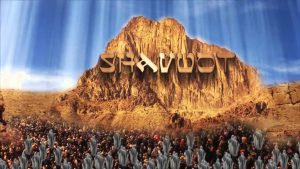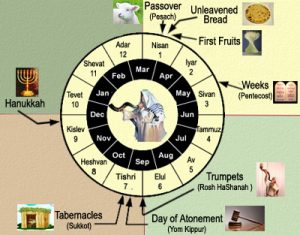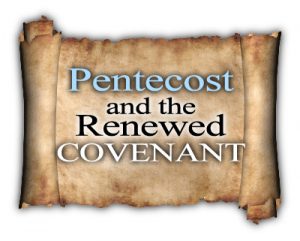Acts 2: Shavuot/Pentecost, the Day God Renewed His Covenant
Author: Bobby Valentine | Filed under: A Gathered People, Acts, Bible, Church, Exegesis, Hermeneutics, Holy Spirit, Jesus, Jewish Backgrounds, Luke, PentecostActs 2, What is It?
I grew up being taught that Acts 2 is “the hub of the Bible” (J.D. Bales), the “birthday of the church,” when Christianity began and God changed the world by essentially getting rid of the “Old Covenant” and now the law of Christ began. These are fairly traditional inherited Protestant readings of the “Day of Pentecost.” There is some truth in some of these, but what might Acts 2 signal for the author of Luke-Acts? This is our investigation.
Convergence
When we open our Bibles to Acts 2 and read about the loud, violent, wind and fire on the heads of the 120; when we read about people from all over the known world gathering in the Temple at that time; and when we read Peter quoting from Joel 2 on the Holy Spirit being poured out upon men and women; sons and daughters; old and young, male and female slaves, and even prophecy from women and men, we see a great convergence taking place in Luke’s narrative.
Israelites, in Luke’s day, had a massive amount of information converging on this single point. All of these motifs are “Pentecostal” themes embedded in the Hebrew Bible and scattered throughout Second Temple Judaism that explode on the scene in Acts 2. Rich and varied themes come together here and point to far more than the birth of the church. The church, as we will see, Luke does not believe is “separate and apart” from Israel or the People of God that already had centuries and centuries of relationship with Yahweh.
Pentecost is, in essence, the declaration by God and Israel “we have a long history and we want it to continue.” It is the REnewAL of God’s covenant at the Feast of weeks/ingathering/first fruits/Pentecost.
How is this? Sadly in a day when we are awash in various Bible translations many do not know the story, nor the structure, of the biblical narrative nearly as well as those in Luke’s day that never in their lives ever owned a Bible.
Foundation of Joy in the Torah
The Torah provides several texts which direct when and where Shavuot is to be observed. It is celebrated fifty days after Passover (i.e. the Exodus) as wheat and barley (the ingredients for beer which helps explain why some assumed the disciples were drunk btw) are harvested, as the book of Ruth depicts.
Shavuot presupposes, is dependent upon, and responding to, the prior act of God’s salvation of Israel by his glorious grace. The festival always looks back to the history of God’s incredible faithfulness to Israel from the call of Abraham, thru the Exodus, until “now” or “present” in which I, the worshiper, live (more on this in a moment).
Exodus comes Before Sinai.
Calvary comes Before Pentecost
Grace Comes before Faith.
But God’s grace is not simply in the past historical act of redemption from the terrorist regime of Pharaoh but is expressed in Yahweh’s continuing loving care for all in lavishly providing them food and drink in the present.
Pentecost is itself Yahweh grace towards God’s people. Shavuot interweaves God’s providential care with his historical acts of grace. When we gather our crops together, we come before the Lord to celebrate in joyful worship. So Deuteronomy 16.9-12 tells us that Shavuot is about gratitude for grace.
“And you shall make the Festival of Weeks for YHWH your God, contributing a freewill offering of your hands which you shall give just as YHWH your God blesses you. And you shall rejoice before YHWH your God, you and your son and your daughter and your male and female slave and the Levite who is in your gates, and the alien/stranger/foreigner and the orphan and the widow who is among you … And you shall remember that you were slaves in Egypt and you shall diligently observe these statutes” (Deuteronomy 16.10-12, BV; See Leviticus 23.15-21)
The freewill offerings reflect how grateful we are. Joy is the characteristic of this festival of worship according to the Deuteronomy. Moses says we come before the Lord and “rejoice” because Israel has reason to rejoice.
Note carefully that language in Deuteronomy 16. It will show up again. The Festival is not just a gathering of men. Instead get your sons, daughters, widow, Levites and even male and female slaves, bring them with you and celebrate in the Presence of the Lord. Please note that Deuteronomy specifically mentions the male and female, slave and free … classes of people that appear in Acts 2. Pentecost is egalitarian grace for all! This theme never departs from Shavuot.
Shavuot says we have a history that reaches way back before I was born, continues into the present, and we want it to continue in the future.
We are part of that Story. We are here because of God’s rich provision of grace that meets every and all needs. As I noted in a previous post Israel did not so much as read the Bible but reenact it. Shavuot is Israel rehearsing the Story of the Bible in dramatic form.
 We are Part of the History of Redemptive Grace … Shavuot is about Us not Just Them
We are Part of the History of Redemptive Grace … Shavuot is about Us not Just Them
In the Torah we read the epic “Pentecostal” text Deuteronomy 26.1-11. It fleshes out what 16.10-12 point to.
In the third month we gather our family, friends, aliens, and any that will come for the pilgrimage to the Temple. But what will we do? What will we say? On that day we come into the Presence of the Lord to confess (I paraphrase)
“we have a long history! you have loved us from ages past. never was there a time you did not love us! we are here because of your faithfulness to the covenant! we are here as proof of your grace, mercy, love and your commitment to the covenant of hesed. Thank you LORD for loving us”
This is what gathered Israelites confessed. Deuteronomy 26 tells us, have ears to hear!
I, in the presence of the Lord, with my sons, daughters, slaves, aliens and all, say
“Today I declare to YHWH that I have come into the land you swore to our ancestors” (26.3).
Immediately we, not just me, are connected to the grand sweep of the Story of God’s Steadfast love (Hesed) and his faithfulness from the time of Abraham to “now.” The mere fact that we are here is proof that Yahweh has kept his promise of grace.
Then we make that astounding confession, it is the great summary of Israelite faith, in vv. 5-10,
“A wandering Aramean was my father, he went down into Egypt …
we were afflicted …
we cried out …
YHWH heard our cry
and brought us out and brought us to this place [= temple]…
So now I bring O YHWH, the first fruit of the land that you gave back to you.”
And we rejoice!
We rejoice with the aliens (i.e. Ruth! Ruth is a Pentecost book!).
We rejoice with the slaves.
We rejoice with women.
We rejoice with the priests.
The covenant is not just with those in the distant past, it is with us now!! God’s grace, God’s promise, God’s love is for us.
The covenant is REnewED in our time and with us. In Acts 2 everyone of those thousands of people were coming to Jerusalem to make that confession from Deuteronomy 26.
The Festival “says” we have a history God and we want it to continue, we want the covenant of old renewed in our own day.
Already we can see that Shavuot, or Pentecost, is of huge importance in the worship of the people of God.
Yahweh Married Israel on Pentecost
But there is a major though often missed point. The covenant that God made with Israel, the awesome revelation of his Presence at Mt Sinai, and the giving of his holy word was entered on what later was called Pentecost. God entered into a marriage with Israel – a covenant of love–in Shavout.
“On the third new moon after the Israelites had gone out of the land of Egypt, on that very day, they came into the wilderness of Sinai …
YHWH called from the mountain, saying …
You have seen what I did to the Egyptians, and how I bore you on Eagles wings and brought you to myself …
you shall be my treasured possession out of all the peoples ...” (Exodus 19.3-5)
Sinai is three months after the Exodus. Shavuot is three months after Passover. After the Bride has been liberated, the Lord enters into a marriage covenant with Israel. The Torah was like a bridal gift and is seen as such throughout the Hebrew Bible.
But God gave more than the Torah at Sinai, he gave himself! The Book of Exodus does not climax at the Red Sea but the glory of the Lord filling the tabernacle (i.e. a portable “temple”). So declares Exodus 40.34-48. God saved Israel a the Passover (Exodus) but God came to dwell with us at Shavuot!
We will note more of this in a moment but it shows up in Acts 2, no Jew missed it.
Pentecost Was a Time for Renewing the Covenant
From the beginning, Shavuot, Pentecost, pointed to God’s long history of grace with his people, combined with his daily care for the needs of his people. It pointed to the covenant.
As we saw in the previous section, Pentecost provided Israel an opportunity to respond to God’s grace. Free will worship. Celebration and Joy are the mood of this great festival of Yahweh. How grateful am I?
Since Pentecost provided Israel with a way of responding to God’s grace in faith and joy, it became a time not just to acknowledge our standing in the covenant. Rather Shavuot was believed to be a time to renew the covenant for people that were terribly sinful and unfaithful. Faithless Israel was just the opposite of their faithful Lord.
Thus we see in that rarely read book, 2 Chronicles, of a covenant REnewAL in the time of king Asa. The prophet Azariah met Asa and told him
“for a long time Israel and Judah was without the true God, the teaching priest and without Torah” (2 Chronicles 15.3).
After exhortation, Asa was led to repent and called all Israel and Judah to come and renew the covenant of God’s love. So in the “third month” … aka the time for Shavuot/Pentecost … they entered into a “covenant to seek YHWH” all over again (15.10-15). The covenant they entered is not a different covenant but the same covenant they have been unfaithful to is renewed and recommitted to.
As Judah took an oath during this covenant ceremony they
“rejoiced … with all their heart,
and had sought him with their whole desire,
and he was found by them,
and YHWH gave them rest …”(15.15).
Even greater than Asa however, was the renewal of the covenant at Mt. Sinai itself. Moses had not yet descended from the mountain before Israel tragically shattered the covenant, with the assistance of Aaron no less. The Golden Calf is to the history of Israel what the eating of the forbidden fruit is for all humanity … a great Fall! (Exodus 32-33). God threatened to destroy the children of Israel and fulfill his promises to Abraham through Moses himself. As Moses interceded with Yahweh grace was given. Moses returned to the mountain to hear God reveal his name in that epic text of Exodus 34.6-7, the God Creed. See my Wineskins article on this most important text in the Bible, Exodus 34: The Pulse of the Bible.
What we may not have remembered is that God says
“I hereby make a covenant. Before all your people I will perform my marvels … for it is an awesome thing I will do with you” (34.10).
The chapter relates how God has renewed his covenant mentioning both Unleavened Bread/Passover and Weeks by name (34.21-28). Israel’s experience at Mt. Sinai was not just the giving of the marriage to Israel but also the scene of the first covenant renewal in the face of scandalous sin.
Pentecost was the time for the whole faithless nation to come before the LORD and make the confession of Deuteronomy 26. We have a long history Lord, you have always been faithful and gracious before we were even born and that we are here in spite of our faithlessness, show how faithful and true you are.
God initially gave his covenant, his torah, and himself on Shavuot. It became the day on which Israel hung hopes and dreams of mercy, grace, and renewal in the future just as it was for Asa.

There are many resources on Pentecost but Park’s work is the most extensive exposition I know. Great discussion on the Hebrew Bible, Apocrypha, Jubilees, Dead Sea Scrolls and Luke/Acts
Shavuot: Great Expectations of Hope, Healing and Renewal
By the time of Jesus, and Acts 2, a lot of water had passed under the bridge. Never once, even for a moment, was God untrue to his covenant.
Sadly the same cannot be said for God’s people in either Testament. Unfaithfulness has been the single greatest recurring theme in this history of our Ancestors. That unfaithfulness lead to the destruction of Jerusalem, the temple and Exile among the nations. One Empire after another trod over the heads of people of God. Had the covenant been undone?
Even with the promise of Haggai, and the rebuilding of the Temple, it was not always felt like God had healed “us.” Even with the Maccabees it was felt that God’s promises were not quite realized.
Pentecost was a time of great expectations. Another Sinai would happen!
Long before Jesus was born, Jews believed that on Pentecost a powerful and great renewal would take place. As great as Sinai itself. God would act. God is faithful. We confess it every Shavuot. We confess we have a long history and we want it to be more glorious in the future than it has even in the past.
In an influential work known as Jubilees, which is essentially a retelling of the history of Israel, we learn that Jews believed that Shavuot was, interestingly enough, as old as the creation itself. Noah had celebrated Shavuot. Then the world in its rebellion no longer acknowledged the true God. In Jublilees Shavuot was restored to the world when God gave his covenant, his torah and himself at Sinai. And every year they gathered before the Lord to renew that covenant that was made by God. Each one points to the great Shavuot when something like Sinai might happen again. Thus we read,
“For this reason it has been ordained and written on the heavenly tablets that they should celebrate the festival of weeks during this month–once a year–to renew the covenant each and every year. This entire festival had been celebrated in heaven from the time of creation until the lifetime of Noah … Abraham alone kept it, and his sons Isaac and Jacob kept it until your lifetime. During your lifetime the Israelites had forgotten it until I renewed it for them at this mountain” (Jubilees 6.17-19).
In Jubilees, Pentecost became the occasion that God renewed his covenant with Noah, then Abraham, then Moses and the great Hope was that God would do the same again in our time. We know that the Essenes of Qumran practiced Shavuot as a covenant renewal celebration, every year. It was not a different covenant but the same covenant made new.
The Story of Ruth is read publicly during Shavuot. It is in fact a story the celebrates many key themes of this great worship festival. The story centers on the marginalized, the fringe, the outcasts, the powerless (those women and slaves!). Even the forbidden woman of Moab were welcomed as part of the covenant, even though forbidden! The story of Ruth is about the nature of hesed and a testimony for those who come to the God of Israel “under whose wings you have come for refuge” (Ruth 2.12).
Pentecost is when all of Israel becomes Ruth the outsider, longing for God to build the house of Israel (see Ruth 4.11).
So, when Israelites came from all over the world in the first century on their pilgrimages, like Pentecost, they had incredible hopes that THIS is the year a new Sinai event would take place. They came far and wide, confessing with their sons and daughters, the old and the young, the slaves and the free, women and men – standing before the Lord as equal human beings – that God had been faithful. Yahweh has always been faithful. That God will always be faithful. That we standing in his Presence in the Temple is proof of his covenant.
In joy and celebration, we share in the bounties of God’s infinite grace/Hesed. All the while praying that something else may happen – a Sinai happening, an Asa happening.
Thus Joel 2, which Peter quotes, is obviously a “Pentecostal” text. God renewing his covenant not only with Israel but all of Creation. Not with men but women too (Ruth is, interestingly, about older and younger women as is Joel). Not just the young but the old. Not just the free but the slave. All those who stand before the Lord on Shavuot are equal and equally graced.
So when the loud sound of a hurricane appeared (Luke’s word can be translated as “roar”) and fire in the sky upon the peoples head … No Jew reading this would mistake what is happening. When God shows up, stuff happens in the Hebrew Bible.
God showed in a storm of smoke and fire at Sinai. God shows up in the violent thunder storm in the temple(!) in Psalm 29. God shows up, and speaks, out of the storm in Job. God shows up in fire when he revealed his Name at the bush. God shows up in fire and smoke at Sinai in Exodus 19. God shows up in smoke and fire in numerous Psalms. God shows up in fire, smoke and roars in Habakkuk 3.
What we hoped for, what we prayed for, what we dreamed of, is taking place.
God is renewing God’s covenant – finally.
God is making it new.
God is giving his Word.
God is keeping the Promises.
God is giving God’s self, the Spirit to dwell with us.
Acts 2 is the great long awaited for Shavuot that revealed that God was STILL true to the promises to the patriarchs. It is God who is saying “we have a long history and it will never end.”
This is why Peter, hardly containing himself, says THIS is THAT (Acts 2.16)… this Shavuot – the stuff you are busy sharing and confessing as you sacrifice with your family, friends, neighbors – is THAT long promised renewing Pentecost.
The disciples asked Jesus when he would restore the kingdom in Acts 1.6. This was not, as I was taught, a misguided question. It is based directly on the Hebrew Bible. God has rescued his people again at the Cross of Christ. The New Exodus has taken place. It is natural, being schooled in the rhythm of Israel’s history, to expect the next event to be the renewing of the covenant at … Shavuot! And God did. It happens in Acts 2.
Acts 2 is to Jesus’s Death/Burial/Resurrection what the theophany, torah and covenant on Sinai is to the defeat of Pharaoh and the Red Sea. To say that again differently, Act 2, Pentecost, is to the Cross, what Mt. Sinai is to the Red Sea.
God has renewed his covenant. This is a big deal for Luke who stresses so powerfully – and directly contrary to many Christian theologies – that God did not replace Israel with the church. God restored Israel by renewing his covenant and giving himself in the Spirit. Luke’s allusions to “Pentecostal” themes flow throughout Acts but we do not have time to review them here. This renewal will include the down and outs and Gentiles.
Final Thought: We Continue to Be Part of the Story
We sometimes call Acts 2 the “birthday of the church.” Perhaps in a sense that is true. But the world “church” never appears in Acts 1, Acts 2, Acts 3, nor Acts 4. The first time the word “church” appears in the story of Acts is 5.11.
But something massively important happened on Pentecost, but it was not the beginning of a new (=different) people of God. Luke would not call it the birthday of the church, if we mean by church “the people of God.” Pentecost is not the creation of God’s people, but the renewal of his people, in fact it is almost a resurrection from the dead like in Ezekiel 37.
I think Luke would say such a position is false and unbiblical. Acts 2 records the great eschatological renewal of the covenant with God’s ancient people with their long history of disobedience, yet God saves and comes in covenant by love just as God did with Abraham, just as God did in the Exodus, just as God did with Asa, just as God does with us.
The REnewED covenant certainly has some differences with the older one but it does not have a different God and it does not have a different people. In fact it is,
Same God.
Same Promise.
Same Mission.
Same People Renewed.
This and so much more is going on in Acts 2 … the great covenant renewal on the Day of Pentecost. God gave the covenant of love. God gave God’s word (revelation). God gave himself on this day.
Now you see why Israel rejoiced and celebrated with a great joy on this day.
We should too.



June 6th, 2016 at 9:36 am
While a continuation of the Kingdom, the day of Pentecost did bring in a new concept, Christ the savior and our covenant with Him and in Him. The connection to God was through Jesus, the final and complete sacrifice for all mankind. The Day of Pentecost was for the Jews, but this day on the day of Pentecost was for all.
In car speak.
God didn’t simply give us a new car and didn’t simply repaint the old. God took the exterior off and replaced it with a new exterior while leaving the frame intact of love, faith, grace and mercy.
And not just any prophet behind the wheel, but the Son of God.
And the master command code, “Love as Jesus loved.”
June 9th, 2019 at 10:20 am
thanks as always I need a book with this in it any ideas
June 10th, 2019 at 2:37 pm
appreciate you reading John Acuff
August 11th, 2023 at 2:25 am
Overall, this was an excellent and thought-provoking look at Pentecost.
I wonder, however, if you might do a blog sometime on the phrase, “God showed up.” This is endemic in some church circles and anathema in others. I lean toward the anathema side. God has not been absent, and to me it seems like a major lack of faith to suggest God is only present when He’s working miracles or enacting signs and wonders. I’d love to hear the reasoning behind your use of this phrase.